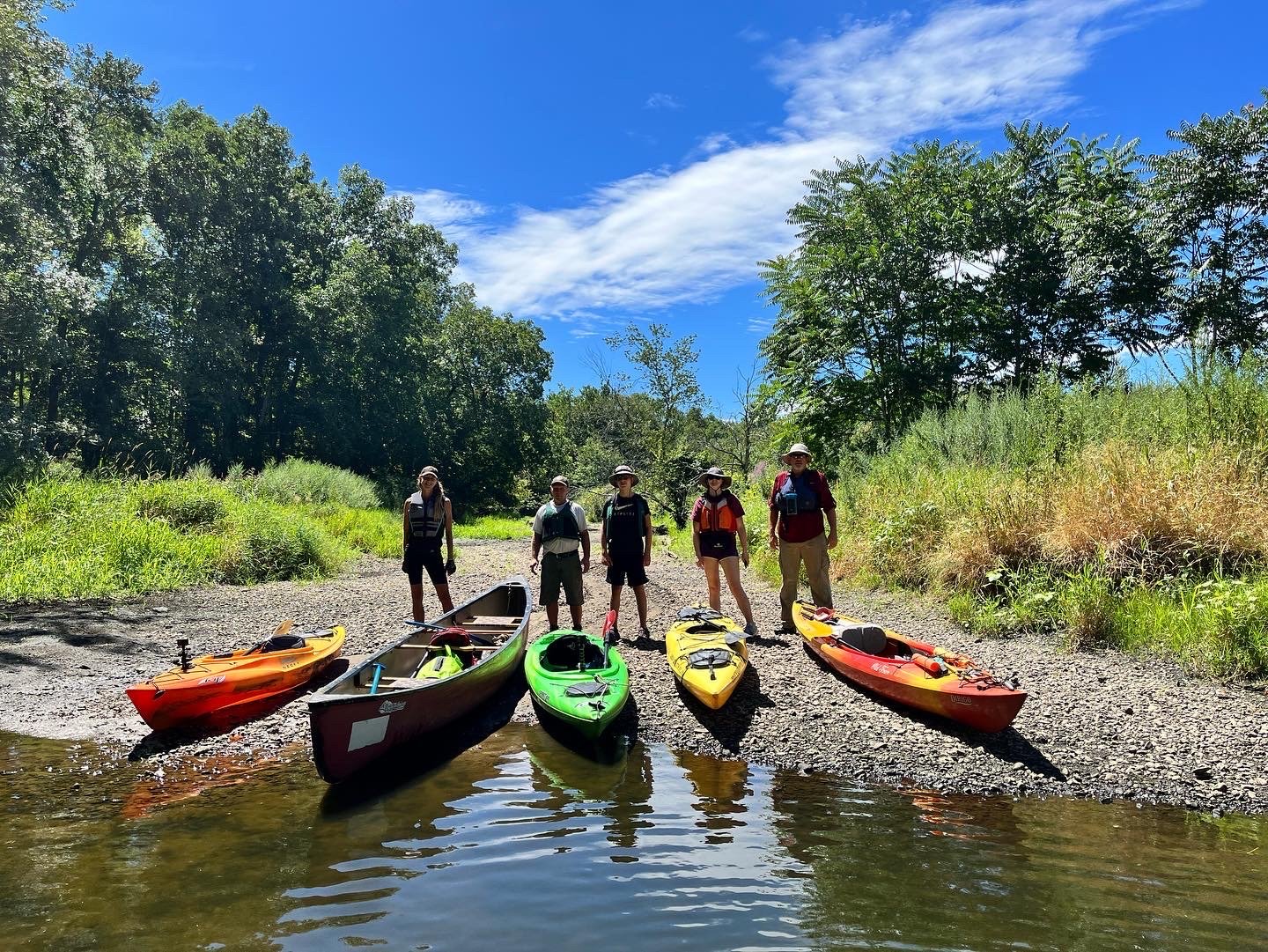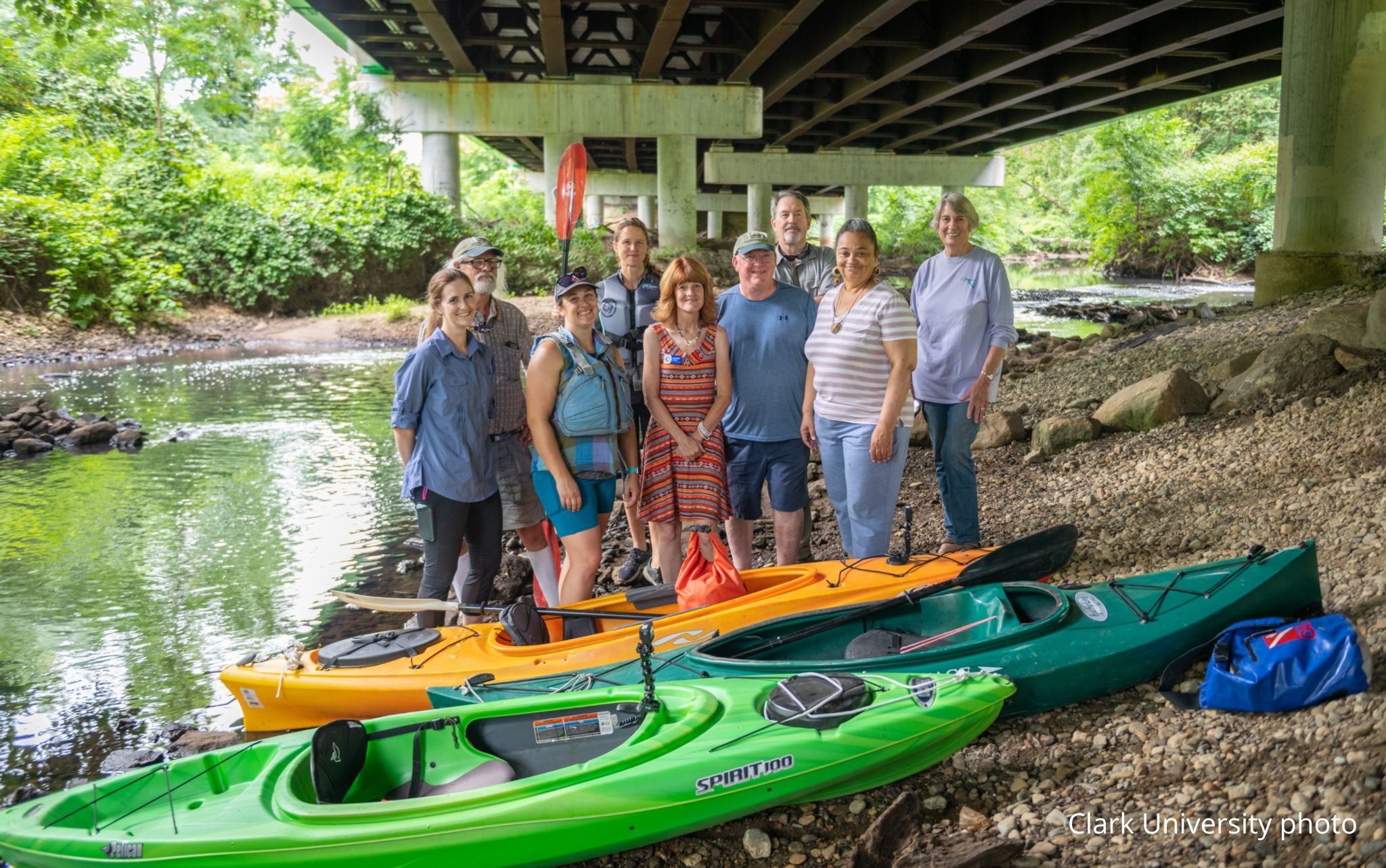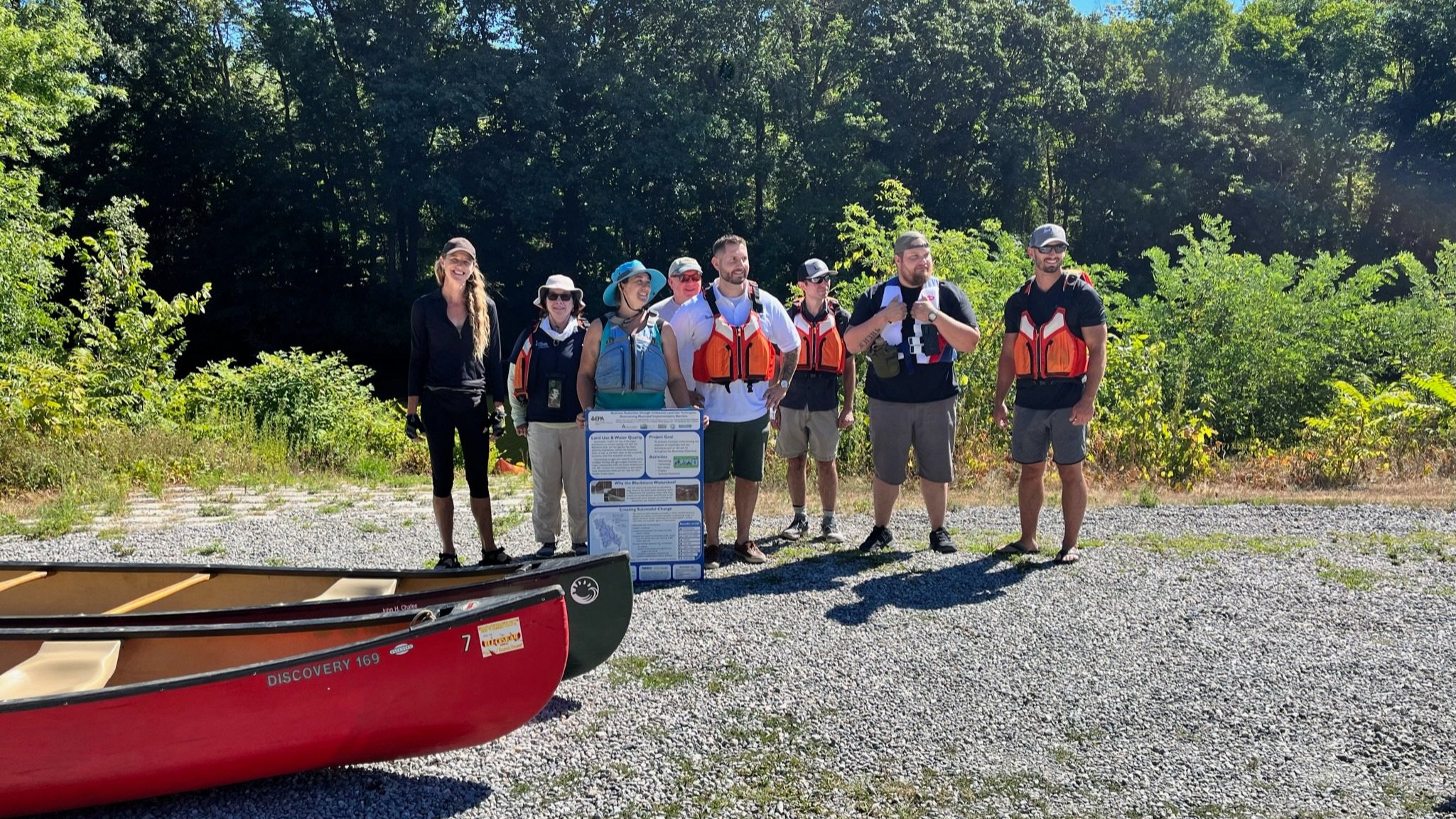
Expedition 2022: Blackstone River Commons 60 Mile Paddling Journey
On August 11 - 14, the Blackstone River Commons Group paddled 60 miles from the headwaters of the Blackstone in Worcester, MA through its connection to the Seekonk River and on to the Narragansett Bay in Providence, RI. We are so grateful to all our partners, volunteers, and paddlers who made this project possible!
The trip was loosely modeled after the Expedition 2000 that inspired many people to get involved in work on the River. Each day, the paddlers met with different stakeholders and advocates along a different stretch of the Blackstone to reflect on the complex histories of the river and envision what a resilient, vibrant, and diverse future looks like for the watershed.
These ongoing conversations build on the recently published Blackstone River Needs Assessment Report and help lay the foundation for the work ahead.
To amplify the issues and leverage this opportunity, we are inviting decision makers, community leaders, and the public to meet us during portions of the trip and at community engagement events throughout the year.
Learn more about past engagement events here.
Expedition 2022 Highlights
August 11: Worcester, MA – Fisherville, MA
Expedition 2022 kicked off with a press event at the headwaters of the Blackstone River at the Blackstone Heritage Corridor Visitor Center in Worcester, MA. Bruce “Star” Curliss, Tribal Member of the Hassanamisco Band of Nipmuc opened the event with a blessing that centered participants on the interconnectedness of the communities along the Blackstone and the power of water as life. MA State Representative Mary Keefe, Upper Blackstone Clean Water Director Karla Sangray, Worcester Department of Public Works Commissioner Jay Fink, and Narragansett Baykeeper Mike Jarbeau gave remarks on the challenges of climate change and historic contamination in this urbanized headwaters and the need for partnerships to move forward to implement nature-based solutions to ensure future generations had clean water to live with and recreate in.
True to the character of the urban headwaters, the paddlers put in under a highway overpass in Worcester, headed for Grafton, MA. The drought conditions and low water levels forced the expedition team to drag their boats dozens of times within the first few hours alone. They scaled a mountain of trash piled up behind a culvert and portaged around six dams. Despite the persistent litter, invasive species, old concrete and rebar, and 33 dumped tires, the Blackstone was alive with an abundance of wildlife, including lots of great blue herons and kingfishers, and even a bald eagle.
Letters to the River
In addition to the paddle, RISD and the Blackstone Commons Group are asking… if you could have a conversation with the Blackstone River, what would you say? You’re invited to write a letter, story, poem, or share a drawing to the Blackstone, some of which will be published in an anthology alongside essays, archival materials, interviews, and art.
Learn more at blackstonerivercommons.org
The Blackstone River is a commons to be shared by the community and kept open and protected for future generations. In this spirit, Expedition 2022 was made possible through the collaborative efforts of many different partners.
In partnership with:
Rhode Island School of Design and Counterform Studio
Blackstone River Watershed Council/Friends of the Blackstone
Rhode Island Canoe and Kayak Association
Save The Bay - Narragansett Bay
Blackstone River Coalition
Blackstone River Valley National Heritage Corridor
Narragansett Bay Commission
Narragansett Bay Estuary Program
The Nature Conservancy in Rhode Island
Massachusetts Department of Conservation and Recreation
Rhode Island Department of Environmental Management
Narragansett Brewery
Special thanks to:
EPA Region I
Nipmuc Nation
MA State Rep. Mary Keefe
RI Senator Jack Reed
Upper Blackstone Clean Water
Worcester Department of Public Works
In recognition of:
Clark University Human-Environment Regional Observatory (HERO)
Blackstone River Valley National Historic Park
Blackstone Valley Tourism Council
MA Municipal Vulnerability Preparedness (MVP) Program
Mystic Aquarium
Science with Amanda
Uxbridge, MA Board of Health
ZAP 50
August 12: Fisherville, MA – Blackstone, MA
Low flows on Day 2 highlighted the severity of the summer drought. Between Plummer’s Landing in Northbridge, MA and River Bend Farm in Uxbridge, MA, the team ran out of water and carried their boats for nearly a mile to reach a navigable flow, along with local paddlers Ed and Jack Oleksyk and EcoRI reporter Colleen Cronin. The group arrived at the public festival at River Bend Farm three hours behind schedule, but with many cheers. The Blackstone RiverFest was hosted in partnership with the MA Department of Conservation and Recreation and invited nearly 300 members of the public to engage with numerous community and environmental groups including the Uxbridge Board of Health, Mystic Aquarium, Upper Blackstone Clean Water, Massachusetts Energy & Environmental Affairs’ MVP program, Clark’s HERO Program, and many others working to improve the Blackstone. Community members enjoyed live music by Stefan Couture and Jake Hunsinger and food from the Mendon Street Kitchen and Sweet Wise Ice Cream.
After a brief break at the festival, the team paddled the remaining nine miles of the day’s itinerary to Blackstone Gorge finally ending the day at 9pm.
August 13: Blackstone, MA – Central Falls, RI
On Day 3, the expedition team paddled a portion of the river with several participants in RI Department of Environmental Management’s Waste Water Treatment Facility Leadership Boot Camp and DEM’s Bill Patenaude. From River’s Edge Park in Woonsocket to the Manville Dam, the expedition team discussed shared priorities in water quality management and how they can better support the work of the operators in protecting the health of the Blackstone and its communities.
Day 3 also highlighted several areas needing restoration. The paddlers saw over 100 tires in the river near the Peterson/Puritan Superfund site and paddled by 20 acres of invasive water chestnut in the Lonsdale Marsh in Cumberland.
August 14: Central Falls, RI – Providence, RI
The expedition team experienced firsthand how difficult it is to travel through a river broken up by extensive legacy dams. On the final morning, the expedition team met with owners of several local dams and RI Department of Environmental Management (DEM) Deputy Director for Natural Resources Jason McNamee to discuss upcoming priorities for improving migratory fish passage over legacy dams. This conversation highlighted the shared values of the many Blackstone River stakeholders in protecting community, economy, and environment.
Over 60 paddlers joined the expedition team for a public paddle of the final four miles of the journey, from Pawtucket to Providence. All were invited to a final celebration hosted by Narragansett Brewery. Speakers included Bruce “Star” Curliss, Tribal Member of the Hassanamisco Band of Nipmuc, RI Senator Jack Reed, EPA Region 1 Administrator David Cash, and RIDEM Director Terry Gray.
Looking Forward
The Collaborative and partners hope to leverage the public awareness and excitement generated through the Blackstone River Commons Expedition 2022 to bring results in improving recreational access, water quality, ecosystem health, fish passage and more. One significant project is continuing to improve public signage along the Blackstone. The Blackstone River has very few high-quality access points and portages, which are seldom sufficiently marked. To improve both recreational access and safety, the Collaborative is leading efforts to improve signage in multiple languages in key areas. To learn how to get involved in continuing the work of the Blackstone River Commons, contact us here, or consider attending one of our monthly meetings.

Expedition 2022: Blackstone River Commons 60 Mile Paddling Journey
The Blackstone River is a commons - a resource shared by the community, to be kept open and protected for future generations
The first step of stewardship is to be aware of what conditions and access points exist so that we can better connect people to understand, love, and take care of this shared resource.







